Heritage soap making connects tradition to modern self-care by infusing handcrafted bars with botanicals and essential oils. You'll blend lavender (2-3%), eucalyptus (1-2%), or lemongrass (2-3%) with seasonal herbs and earth-derived minerals like clays and salts. Choose between cold process (4-6 weeks curing, better lather) or hot process (faster production) methods based on your needs. Each aromatic bar becomes more than soap—it transforms into a vessel for intention, healing, and celebration of your roots.
The Sacred Art of Heritage Soap Making
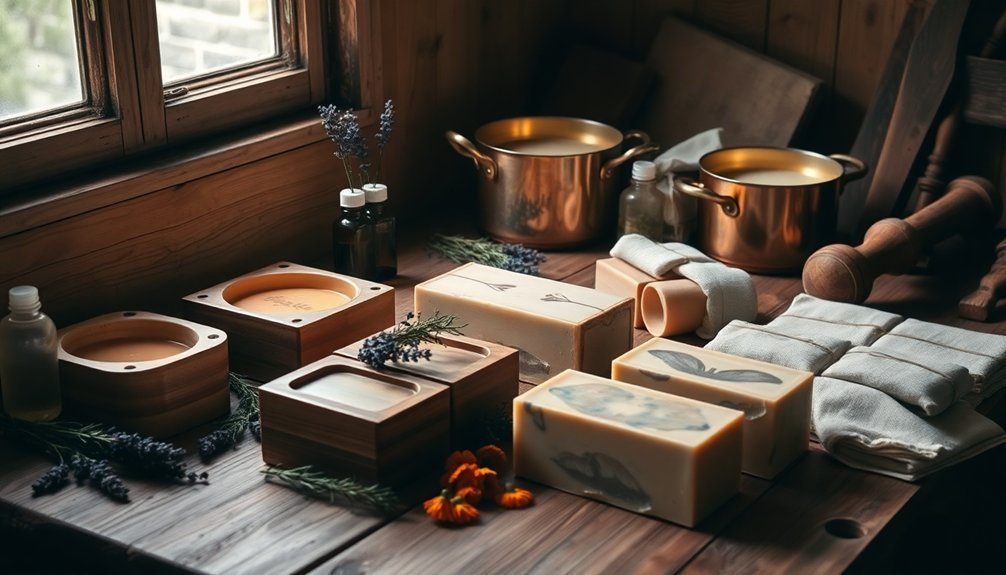
Tradition flows through the gentle curves of handcrafted soap bars, connecting past to present in tangible form.
When you create handmade soap using family recipes, you're participating in an ancient ritual that honors your lineage and spiritual heritage.
Each bar embodies more than cleanliness—it's a vessel for intention and healing. By incorporating therapeutic-grade essential oils and raw botanicals, you transform daily washing into a sacred moment of self-care and reflection.
These carefully selected ingredients work in harmony with earth-derived minerals to nourish your skin while aligning with your energetic needs.
You're not just making soap; you're crafting an experience that grounds you, connecting to the wisdom of your ancestors with every sensory moment, elevating an ordinary routine into a meaningful celebration of your roots.
Essential Oils: Nature's Aromatic Treasures
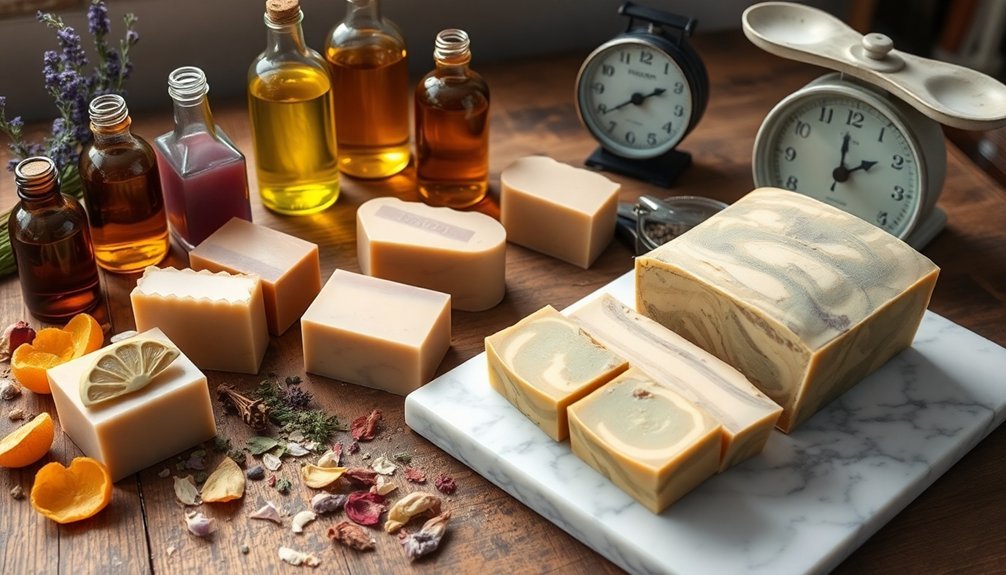
At the heart of every Heritage soap recipe lies the soul of nature itself—aromatic compounds captured through careful distillation. When you make soap with therapeutic-grade essential oils, you're not just creating fragrance—you're infusing wellness into daily rituals.
| Essential Oil | Benefit | Usage % |
|---|---|---|
| Lavender | Calming, grounding | 2-3% |
| Eucalyptus | Invigorating, clarifying | 1-2% |
| Lemongrass | Energizing, uplifting | 2-3% |
These botanical treasures comprise approximately 3% of your soap by weight—enough to transform a simple bar into a sensory experience. You'll find that each oil contributes unique properties beyond scent, nourishing skin naturally while honoring ancient traditions. Consider safety guidelines carefully, as these concentrated extracts require respect and knowledge to harness their full potential.
Botanicals Through the Generations: Traditional Infusions
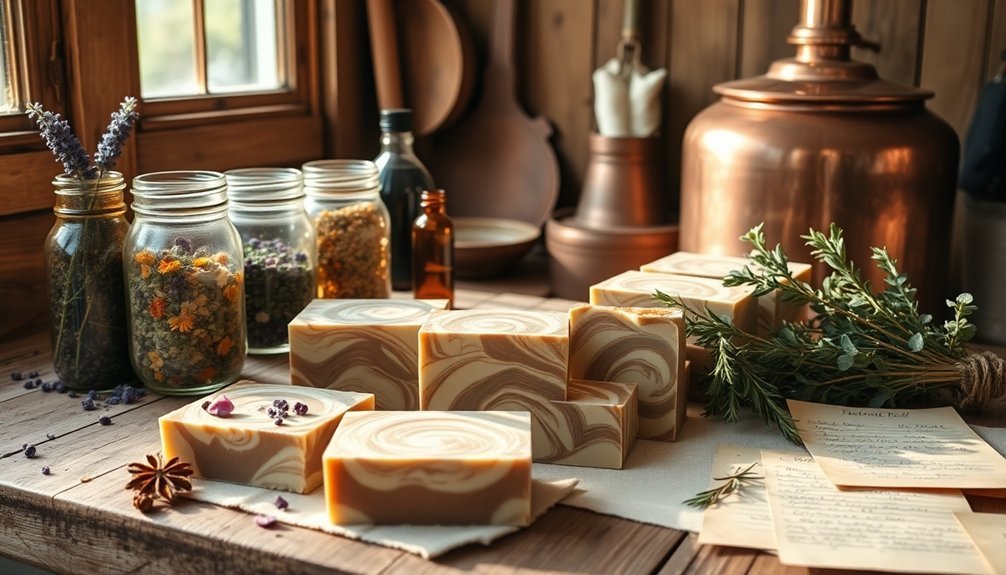
You're tapping into ancient wisdom when you steep calendula petals or lavender buds in oils for your handcrafted soaps, continuing practices that stretch back through countless generations of healers and homemakers.
Family soap recipes often serve as living documents of botanical knowledge, preserving grandmothers' understanding of which plants soothe irritated skin or which flowers bring joy through their fragrance.
These traditional plant infusions don't just create beautiful, aromatic bars—they maintain your connection to healing traditions that have sustained communities long before commercial products lined store shelves.
Ancient Botanical Knowledge Transfer
Long before the advent of modern chemistry, ancestral wisdom held the secrets to nature's healing powers, weaving botanical knowledge through generations of soapmakers.
You're tapping into this centuries-old heritage whenever you create soap with lavender or chamomile infusions, connecting with practices that transcend time.
These herb-infused oils aren't just about fragrance; they're vessels carrying the essential therapeutic qualities your ancestors recognized.
By steeping calendula petals or incorporating neem oil, you're practicing the same meticulous techniques that traditional artisans perfected through observation and experience.
Today's infusion methods preserve these cultural traditions while making them accessible to modern crafters.
When you create these natural remedies, you're not just making soap—you're becoming a guardian of botanical wisdom that bridges past and present.
Family Recipe Preservation
While commercial soap production has become increasingly industrialized, family soap recipes stand as cherished heirlooms, carefully preserved across generations like delicate botanical specimens themselves.
You're not just making soap when you follow grandma's formula—you're connecting to your roots through the careful selection of herbs and lavender buds that your ancestors once gathered.
This preservation process requires:
- Sourcing high-quality raw botanicals that honor the integrity of traditional formulations
- Balancing ancestral techniques with modern adaptations that appeal to today's self-care rituals
- Documenting the spiritual and cultural significance behind each botanical choice
When you infuse your soaps with time-honored ingredients like chamomile and calendula, you're not only creating something that cleanses—you're continuing a legacy that speaks to both heritage and healing.
Healing Plant Traditions
The wisdom of botanical infusions in soap offers a profound connection to our ancestors' understanding of nature's pharmacy. When you infuse oils with lavender or rosemary, you're participating in practices that span centuries, creating healing soap that carries both aromatic pleasure and therapeutic benefits.
Ancient Egyptians and Romans pioneered these techniques, incorporating local herbs into their cleansing rituals.
You'll find this knowledge preserved across cultures—chamomile and calendula for inflammation, aloe vera and neem for specific skin conditions—each plant carefully selected for its medicinal properties.
Crafting Your Signature Scent Blend
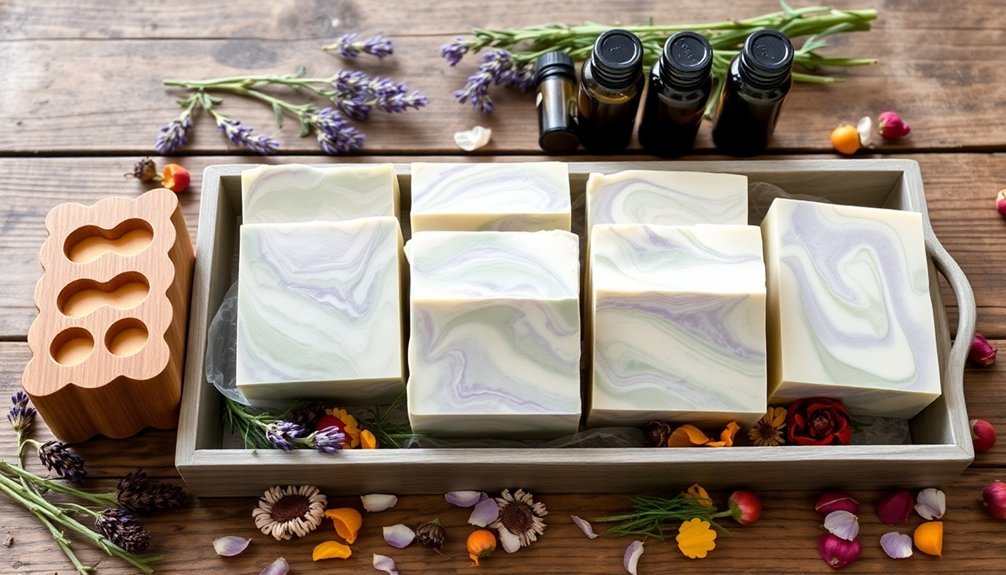
Creating your own fragrance blend transforms ordinary soap into a personalized sensory experience that can energize, calm, or balance both mind and body.
When selecting essential oils, make sure to balance top, middle, and base notes for a harmonious fragrance that lingers. Aim for approximately 3% essential oil content by weight to achieve ideal scent without irritating skin.
- Combine complementary scents like sweet orange with lavender for uplifting tranquility
- Experiment with unexpected pairings such as eucalyptus and peppermint for invigorating clarity
- Document your blending trials to refine successful recipes over time
Your signature blend should reflect your desired emotional or therapeutic effects.
With practice, you'll create aromatic combinations that make your handcrafted soaps truly distinctive and meaningful.
Earth-Derived Minerals and Their Spiritual Properties
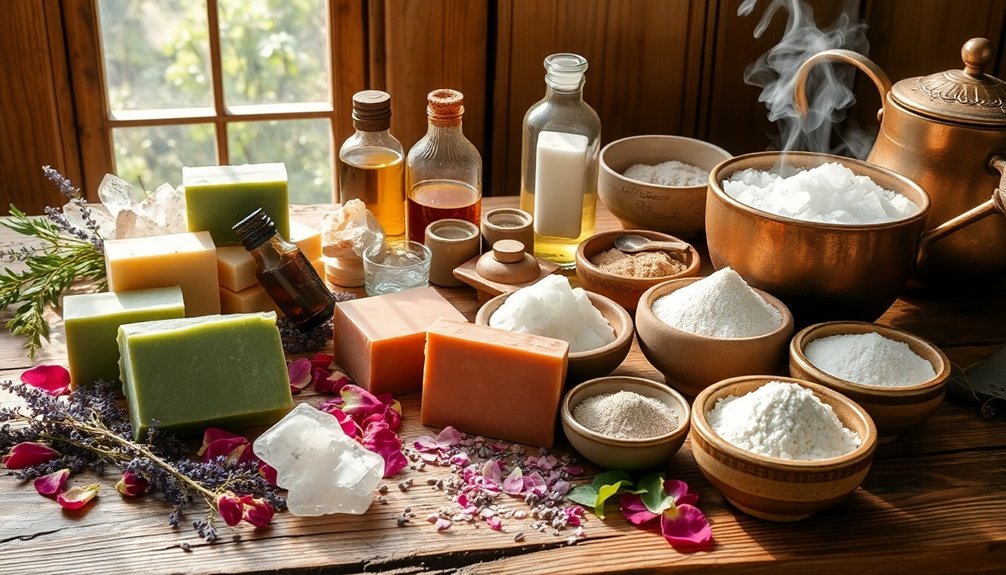
When you incorporate natural clays into your handcrafted soaps, you're embracing ancient cleansing rituals that connect physical purification with spiritual grounding.
The mineral-rich salts from sacred places like the Dead Sea and Himalayan mountains infuse your creations with renewal properties that transcend mere bathing into meaningful self-care ceremonies.
These earth-derived minerals carry unique energetic signatures that you'll feel working on multiple levels as they balance your chakras and enhance the mindfulness of your daily cleansing practice.
Clay Cleansing Rituals
Ancient and revered throughout human history, clay stands as one of nature's most powerful purifying agents for both body and spirit. When you incorporate clay into your gentle soap creations, you're connecting with traditions that span cultures and millennia.
Bentonite draws toxins from your skin, while kaolin offers a milder cleansing experience for sensitive complexions.
Beyond physical benefits, clay enriches your soap-making practice with spiritual dimensions:
- Grounding energy that reconnects you to Earth's stabilizing presence
- Ritualistic cleansing that purifies both skin and inner self
- Natural earth tones that evoke tranquility during self-care moments
Salt Renewal Properties
Though often overlooked as merely a kitchen staple, salt embodies profound renewal properties that transform artisanal soap into a portal for spiritual rejuvenation.
When you incorporate Dead Sea or Pink Himalayan salt into your Exfoliating Bar, you're harnessing minerals that naturally detoxify and purify the skin while balancing moisture levels.
Your salt-infused soap becomes more than a cleansing tool—it's a conduit for grounding energy. As you wash, the mineral-rich lather creates a sensory experience that connects you to earth's elements, promoting emotional well-being during your daily ritual.
Salt's natural absorption properties draw impurities from both skin and spirit, offering true holistic renewal.
In soap making, these earth-derived minerals don't just exfoliate—they carry energetic properties that cleanse your aura while cleansing your body, creating harmony between physical care and spiritual alignment.
Mineral Energy Infusions
Beyond their physical benefits, earth-derived minerals carry vibrant energetic signatures that infuse your handcrafted soaps with profound healing potential. When you incorporate minerals like Himalayan pink salt and Dead Sea Salt into your natural soap creations, you're not just adding exfoliants—you're harnessing ancient earth energies that promote balance and relaxation.
- Kaolin clay gently draws impurities while grounding your spirit during cleansing rituals.
- Activated charcoal detoxifies both skin and energy field, creating space for renewal.
- Magnesium and zinc minerals heal inflammation while strengthening your connection to earth's elements.
These mineral infusions transform your daily cleansing routine into a meditative practice. By mindfully selecting minerals for their spiritual properties, your soaps become powerful tools for wellness that cleanse beyond the physical—connecting you to nature's inherent wisdom with every use.
The Healing Power of Family Recipe Soaps
When timeless traditions meet botanical wisdom, the Heritage Collection of artisanal soaps emerges as more than just cleansing products.
These family recipe soaps carry stories and healing energy passed through generations, transforming your daily cleansing into a sacred ritual.
You'll discover therapeutic-grade patchouli essential oil blended with raw botanicals like dried orange slices, creating sensory experiences that ground and center your spirit.
Each bar connects you to ancestral knowledge while nourishing your skin with natural ingredients.
As you incorporate these soaps into your routine, you're not simply washing—you're honoring heritage and creating moments of self-reconnection.
The carefully curated scents evoke timeless memories while providing holistic benefits that bridge traditional wisdom with modern luxury, making each use a meaningful act of self-care.
Seasonal Harvesting for Optimal Botanical Potency
The secret to exceptional artisanal soap lies in understanding nature's delicate timing. When you harvest herbs and flower petals at their peak, you're capturing the highest concentration of essential oils and therapeutic compounds they'll ever possess.
By aligning your harvesting schedule with nature's calendar, you'll create soaps with:
- Maximized fragrance profiles that can't be replicated through artificial means
- Enhanced therapeutic benefits from botanicals collected during their flowering or fruiting stages
- Unique seasonal signatures that tell the story of a particular time and place
You'll find that lavender harvested in full bloom and chamomile picked on sunny mornings yield dramatically different results than their off-season counterparts.
This timing-sensitive approach not only supports sustainable practices but transforms your soaps into seasonal treasures that celebrate nature's rhythmic offerings.
Preserving Tradition: Cold Process vs. Hot Process Methods
Once you've gathered your seasonally harvested botanicals, you'll face a pivotal choice in your soap-making journey: which traditional method to employ.
Cold process allows your soap to saponify naturally over 4-6 weeks, preserving delicate essential oils and creating a gentle product with rich, creamy lather. You'll achieve more intricate designs and layers as the soap sets slowly before molding.
Hot process, by contrast, accelerates saponification through heat, producing usable soap within hours. While this method enables faster production and larger batches, you'll sacrifice some lather quality and texture refinement. Your soap will have a more rustic appearance.
Choose cold process when prioritizing therapeutic properties and aesthetic detail. Opt for hot process when time efficiency matters most in your artisanal soap business.
Creating Mindful Self-Care Rituals Through Scent
Beyond simply cleansing the body, artisanal soap making transforms everyday washing into a sacred act of self-nurturing through carefully selected scents.
When you incorporate Heritage Collection soaps into your routine, you're engaging with therapeutic-grade essential oils that promote spiritual alignment while nourishing your skin.
You'll discover these intentional moments become powerful rituals that help you:
- Reconnect with your authentic self through the grounding properties of botanical-infused soap
- Honor your personal heritage while fostering deeper connections to nature
- Capture timeless memories through aromatic essential oil blends that evoke emotional responses
Frequently Asked Questions
Do I Need FDA Approval to Sell Homemade Soap?
You don't need FDA approval to sell true soap made primarily from saponified oils without therapeutic claims. However, if you make disease-treating claims or classify it as cosmetic, FDA regulations apply.
Why Is Artisan Soap so Expensive?
Artisan soap is expensive because you're paying for high-quality natural ingredients, labor-intensive small-batch production, and unique formulations. You'll find the absence of harsh chemicals and the personalized craftsmanship justify the premium price.
Which Aromatic Plant Is Used for Soap Making?
You'll find numerous aromatic plants used in soap making including lavender, eucalyptus, and rosemary. Each offers unique benefits – lavender calms, eucalyptus invigorates, and rosemary provides antioxidant properties for your skin.
What Is the Most Popular Scent for Homemade Soap?
Lavender is the most popular scent for homemade soap. You'll find it's beloved for its calming and soothing properties. It's a favorite among aromatherapy enthusiasts who appreciate its gentle, relaxing fragrance.
In Summary
You're now equipped to step into the rich tradition of artisanal soap making. As you blend sacred botanicals and aromatic oils, you're not just crafting soap—you're preserving heritage. Don't forget that each batch carries the energy of your intention. Whether you're following ancestral recipes or creating your own signature blends, you've joined a timeless lineage of healers who've connected earth's gifts with daily rituals of self-care.
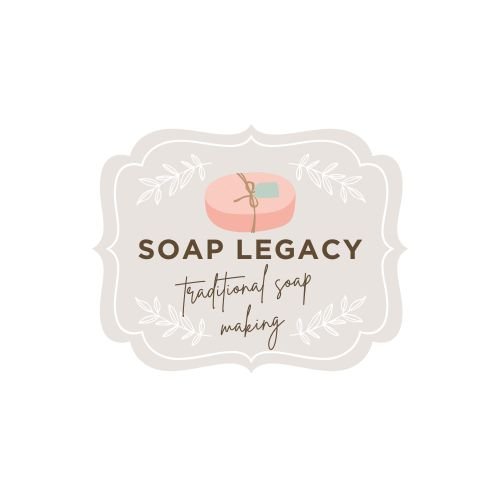

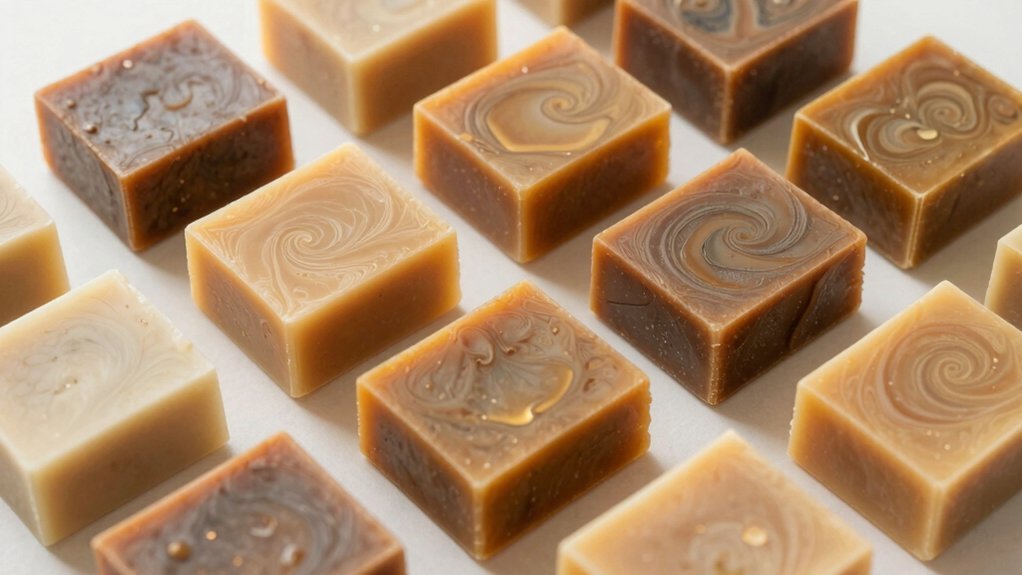
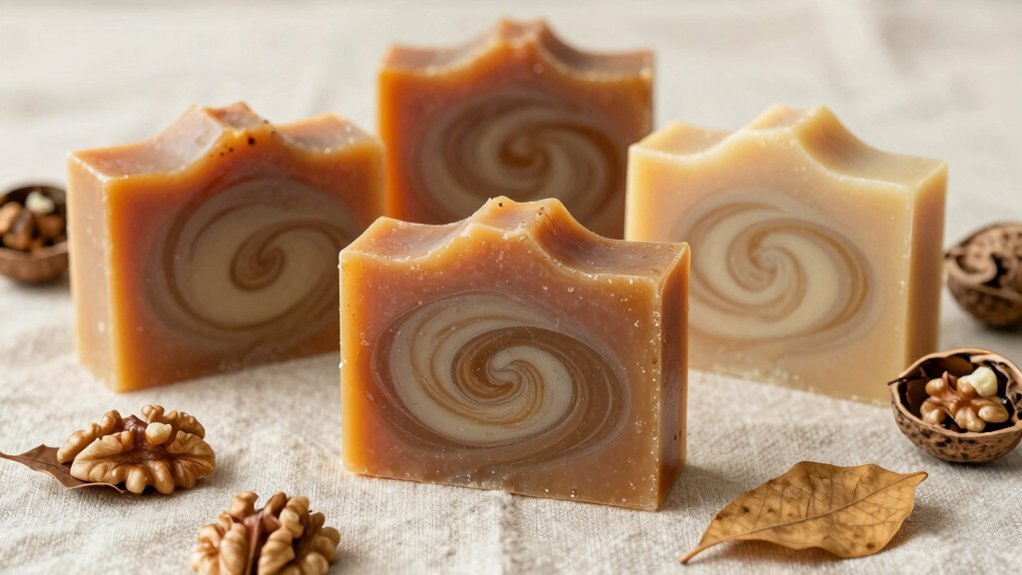
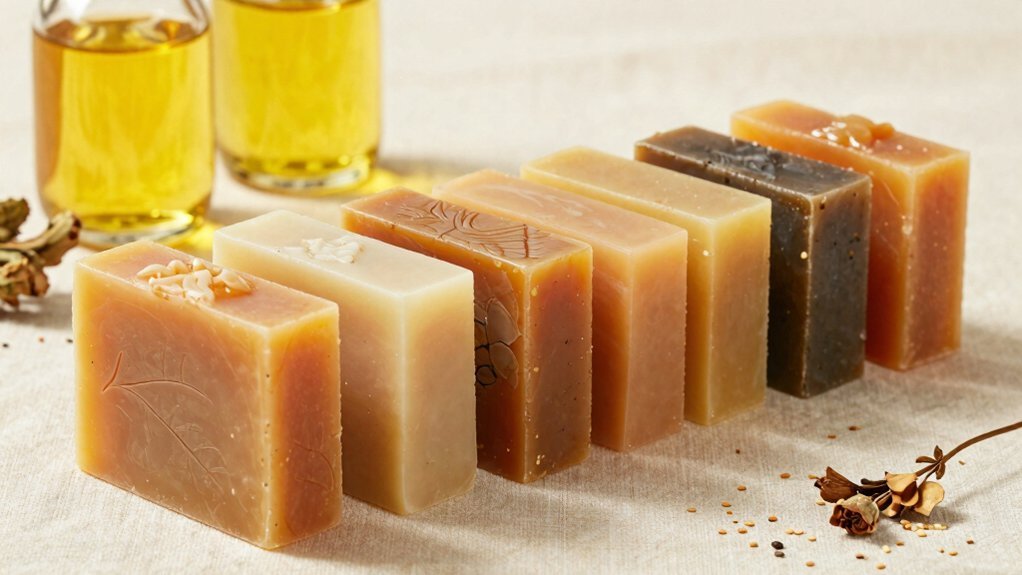
Leave a Reply